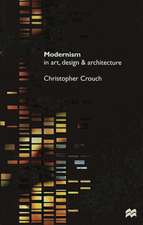A Mirror for England: British Movies from Austerity to Affluence: BFI Silver
Autor Raymond Durgnaten Limba Engleză Paperback – 7 noi 2011
Durgnat usedMirrorto assert the validity of British cinema against its dismissal by the critics ofCahiers du cinémaandSight and Sound. His analysis takes in classics such asIn Which We Serve(1942),A Matter of Life and Death(1946) andThe Blue Lamp(1949), alongside 'B' films and popular genres such as Hammer horror. Durgnat makes a cogent and compelling case for the success of British films in reflecting British predicaments, moods and myths, at the same time as providing some disturbing new insights into a national character by whose enigmas and contradictions we continue to be perplexed and fascinated.
| Toate formatele și edițiile | Preț | Express |
|---|---|---|
| Paperback (1) | 203.54 lei 3-5 săpt. | |
| British Film Institute – 7 noi 2011 | 203.54 lei 3-5 săpt. | |
| Hardback (1) | 544.05 lei 3-5 săpt. | |
| British Film Institute – 7 noi 2011 | 544.05 lei 3-5 săpt. |
Preț: 203.54 lei
Nou
Puncte Express: 305
Preț estimativ în valută:
38.95€ • 40.66$ • 32.23£
38.95€ • 40.66$ • 32.23£
Carte disponibilă
Livrare economică 15-29 martie
Preluare comenzi: 021 569.72.76
Specificații
ISBN-13: 9781844574537
ISBN-10: 1844574539
Pagini: 416
Ilustrații: 79 b/w photos
Dimensiuni: 155 x 235 x 33 mm
Greutate: 0.64 kg
Ediția:Nouă
Editura: British Film Institute
Colecția British Film Institute
Seria BFI Silver
Locul publicării:London, United Kingdom
ISBN-10: 1844574539
Pagini: 416
Ilustrații: 79 b/w photos
Dimensiuni: 155 x 235 x 33 mm
Greutate: 0.64 kg
Ediția:Nouă
Editura: British Film Institute
Colecția British Film Institute
Seria BFI Silver
Locul publicării:London, United Kingdom
Cuprins
Foreword
to
the
2nd
Edition
KEVIN
GOUGH-YATES.-
Introduction.-
Where
We
Come
In.-
When
is
a
British
Film
a
British
Film?.-
Meaning
Cut
Meaning.-
Critic:
Judge
or
Accomplice?.-
PART
I:
THE
STATE
OF
THE
NATION
The
British
Constitution.-
Good
Irresolutions.-
Trouble
at
t'Mill.-
PART
II:
CROSS
SECTIONS
The
Nine
Lives
of
Colonel
Blimp.-
Pigs
in
the
Middle.-
Journey
to
the
Edges
of
the
Working-Class.-
Odds
and
Bods.-
PART
III:
POINTS
OF
VIEW
Left,
Right
and
Centre.-
And
so,
as
the
Sun
Sets
slowly,
We
Bid
Adieu.-
Tunes
of
Bogey.-
Gangrene—British
Style.-
Standing
up
for
Jesus.-
Bloody
Foreigners.-
PART
IV:
OUR
GLORIOUS
HERITAGE
History
is
Bunk.-
The
Impotence
of
Being
Earnest.-
The
Doctored
Documentary.-
PART
V:
THE
AGE
OF
ACQUIESCENCE
System
as
Stalemate.-
Dance
to
your
Daddy.-
Stresses
and
Strains.-
My
Famous
Last
Word
is
my
Bond.-
God
Bless
Captain
Vere.-
Hard
Conscience
and
Nonconformity.-
The
Glum
and
the
Guilty.-
Laugh
and
Lie
Down.-
Love
in
a
Damp
Climate.-
The
Lukewarm
Life.-
PART
VI:
ROMANTICS
AND
MORALISTS
Between
Two
Worlds.-
A
Gothic
Revival.-
Terence
Coloured.-
Shammerteurism.-
Flesh
and
Fantasy.-
The
English
Moralists.-
Have
Scalpels—Will
Travel.-
Suspended
Animation.-
Lists.-
References.-
Bibliography.-
Filmography.-
Index.
Notă biografică
RAYMOND
DURGNAT
(1932–2002)
was
the
author
of
many
groundbreaking
books
about
the
cinema,
among
themFilms
and
Feelings(1967),Sexual
Alienation
in
the
Cinema(1972),The
Strange
Case
of
Alfred
Hitchcock
and
Jean
Renoir(both
1974),
a
study
ofWR:
Mysteries
of
the
Organism(1999)
in
the
BFI
Film
Classics
series,
andA
Long
Hard
Look
at
Psycho(2002),
a
second
edition
of
which
has
also
published
in
the
BFI
Silver
series.
KEVIN GOUGH-YATES Film historian. He is considered the authority on European film-makers in Britain and has written extensively about them. His published interviews and retrospectives in the early 1970s were the first to bring the work of the British director Michael Powell to wider critical attention.
KEVIN GOUGH-YATES Film historian. He is considered the authority on European film-makers in Britain and has written extensively about them. His published interviews and retrospectives in the early 1970s were the first to bring the work of the British director Michael Powell to wider critical attention.
Textul de pe ultima copertă
Raymond
Durgnat's
classic
study
of
British
films
from
the
1940s
to
the
1960s,
first
published
in
1970,
remains
one
of
the
most
important
books
ever
written
on
British
cinema.
In
his
introduction,
Kevin
Gough-Yates
writes:
'Even
now,
it
astounds
by
its
courage
and
its
audacity;
if
you
think
you
have
an
'original'
approach
to
a
filmor
a
director's
work
and
check
it
againstA
Mirror
for
England,
you
generally
discover
that
Raymond
Durgnat
had
said
it
already.'
Durgnat
himself
said
about
the
book
that
'the
main
point
was
arranging
a
kind
of
rendezvous
between
thinking
about
movies
and
thinking,
not
so
much
about
sociology,
as
about
the
experiences
that
people
are
having
all
the
time.'
Durgnat usedMirrorto assert the validity of British cinema against its dismissal by the critics ofCahiers du cinémaandSight and Sound. His analysis takes in classics such asIn Which We Serve(1942),A Matter of Life and Death(1946) andThe Blue Lamp(1949), alongside 'B' films and popular genres such as Hammer horror. Durgnat makes a cogent and compelling case for the success of British films in reflecting British predicaments, moods and myths, at the same time as providing some disturbing new insights into a national character by whose enigmas and contradictions we continue to be perplexed and fascinated.
Durgnat usedMirrorto assert the validity of British cinema against its dismissal by the critics ofCahiers du cinémaandSight and Sound. His analysis takes in classics such asIn Which We Serve(1942),A Matter of Life and Death(1946) andThe Blue Lamp(1949), alongside 'B' films and popular genres such as Hammer horror. Durgnat makes a cogent and compelling case for the success of British films in reflecting British predicaments, moods and myths, at the same time as providing some disturbing new insights into a national character by whose enigmas and contradictions we continue to be perplexed and fascinated.
Caracteristici
New
edition
of
a
classic
film
studies
book
This edition published in BFI Silver, a highprofile new series of reissues of foundational BFI film books
Features a new retrospective introduction by Kevin GoughYates
This edition published in BFI Silver, a highprofile new series of reissues of foundational BFI film books
Features a new retrospective introduction by Kevin GoughYates

















